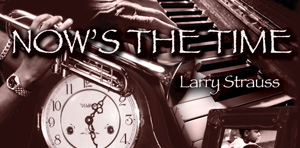Read Excerpt
Page 2
Chapter One:
NYC • Spring, 1976
“Morningside Drive”
My name is Didi Heron and I play the trumpet, and for me, few things are as depressing as the last night of a gig. Maybe it wasn’t that way back in my father’s day, but to quote Bud Powell: “The scene changes.” All the clubs along 52nd Street are gone now, replaced by ugly towers of glass and steel and restaurants I can’t afford. Not too many jazz clubs left in the city and most of them want fusion bands, jazz rock with electric bass and guitar and drums all over the stage, people dancing in front like they just dropped some LSD. Or that freeform stuff, dudes wailing on horns and slamming pianos in the seventy-two tone vortex. So those of us still trying to play bebop—innovating on a smaller scale, one bar at a time—know all about the closing night blues.
Which makes it important to appreciate the little things. The small marquee with Didi Heron Quartet in slightly lopsided black letters above my glossy headshot, my fro thick and round and full the way it hardly ever really is.
When I came through the squat front doorway of Benet’s Night Spot—at 5’8” it’s like entering a mouse hole of music and smoke—Eddie the bartender waved me over. Four dudes faced him at the bar. They were slurping the hard stuff like they needed straws. Eddie was setting up glasses. “Somebody called for you,” he said. “Guy from Ala-something Records.”
“Alamode?” One of the only bop labels left, but to Eddie just another cocktail and some chump change in the tip jar.
“That’s right. Alamode. Like ice cream on pie.”
“What was his name?” I asked.
“Didn’t say. Just wanted to know if you were playing here. I said this was your last night. Then he wanted to know what time the first set got started and if he needed a reservation. I told him not to worry.”
“Great,” I said.
“Can you play?” asked one of the cats at the bar. He took a lusty drag on his cigarette, made the smoke hook up into his nose.
“Man, she all right,” one of his pals said, stuffing tobacco into a corn cob pipe, lighting it with a wooden match. “I caught her set the other night. She halfway decent.” He chuckled. “Got a boy on piano can play his ass off!”
Like I care what these dudes think. I gave them my back. Like Miles. You knew he paid no mind to the peanut gallery. Miles Dewey Davis played for himself and perhaps for some higher musical authority. That’s how you’ve got to be. Like my “boy” Derrick—and he does play his ass off. I knew that from the start. We met at The Bridgeport Jazz Festival. I was with the City College Jazz Band that night and we were up first, to get things swinging while the parking lot filled and people found chairs or rocks to sit on. Everyone in the band was pumped and played loud—and probably drowned out my one solo—but it didn’t matter, because after we finished I got to hear Ella caress the air and Joe Pass make sparks fly off his guitar. Got to catch Lucky Thompson, Johnny Griffin, and Zoot Sims trading fours and then Woody Shaw blowing a tribute to Louis Armstrong.
Later on, while dudes in overalls broke down speakers and amplifiers, one slender guy with dreads and a kaleidoscopic earring sat in front of the baby grand on which Tommy Flanagan and George Cables had taken turns. I figured the guy for an electrician or a tuner. Until he started to play. First with just the left hand, a blues line. Then a crazy chromatic right-hand thing, up-tempo and a little ahead of itself. It made me have to unpack my horn and jam with him. I knew the tune but couldn’t place it until he started this euphonic hum and a weird, muted cry, and I realized it was the Tadd Dameron line, Mating Call.
It seemed to impress him that I knew it.
We played for an hour and I missed my bus back to the city. We played A Night in Tunisia very slow, then Autumn in New York very fast, and after that we just played, a harmonic conversation and for the first time in my life I felt the music coming not from my lips but from somewhere deep.
He drove me back to the city in his battered Midget and I gave him my phone number. We got to dueting regularly and things got intense. We played professionally, here and there, mostly in bars where people tried to talk over the music and sometimes shut up if we played with enough command. Good training. Paying our dues. The money, of course, was shit. But it seemed now like our hard work was about to pay off.

